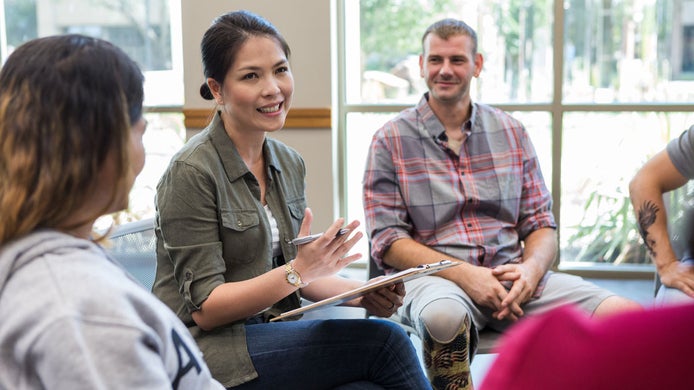Explore our resources for psychology, counseling, and social work degrees and learn about career options that fit your future.

Of all the mental health disorders, eating disorders are the deadliest. According to the National Association of Anorexia Nervosa and Associated Disorders, 10,200 people die every year from an eating disorder condition.
This high mortality rate can be attributed to a variety of reasons, but one contributing factor is that many may not even realize they require help or they’re in danger. In fact, many disordered eating habits are normalized by a growing dieting culture.
For example: People with larger bodies are predisposed to developing eating disorders because of the shame they experience from societal expectations. Many such individuals are encouraged to follow harmful diets that can trigger the development of a disorder.
To give those that suffer from eating disorders a voice and fight against this growing epidemic, it’s important for those around them, especially their professional providers, to recognize the symptoms and help them on the road to recovery.
Gaining awareness of these factors and how they can contribute to the development of a disorder are the first steps in recovery. Use this guide with your patients and clients as you help them navigate these critical conversations.
What Is an Eating Disorder?
To better understand why eating disorders are so prevalent, it is first important to understand what an eating disorder is.
An eating disorder is a serious, potentially life-threatening illness that is characterized by an abnormal relationship with food. People with eating disorders use food to cope with difficult emotions or situations, and they often have a distorted view of their bodies.
Types of Eating Disorders
There are many different types of eating disorders, but here are the most common ones:
Anorexia Nervosa
Anorexia nervosa is an eating disorder that is characterized by an intense fear of gaining weight, severe restriction of food intake and a distorted view of one’s body.
People with anorexia often go to extreme lengths to lose weight or maintain a certain weight, even if this involves harming their physical health in the process.
This disorder is often associated with a devastating impact on one’s physical and mental health, and it can be fatal if left untreated.
Signs and symptoms:
- Intense fear of gaining weight
- Severe restriction of food intake
- Distorted view of one’s body
- Extreme thinness
- Fatigue
- Muscle weakness
- Brittle hair and nails
Bulimia Nervosa
Bulimia nervosa is an eating disorder in which someone consumes a significant amount of food in a period of time. This is usually followed by vomiting or using laxatives to get rid of the food, and potentially even over-exercising.
People with bulimia often feel out of control when they are binging, and they purge in an attempt to regain control.
Like anorexia, bulimia can also have a detrimental impact on physical and mental health, and it can be fatal if left untreated.
Signs and symptoms:
- Extreme weight loss or gain
- Wearing baggy clothes to hide body shape
- Preoccupation with food
- Using the bathroom after every meal
- Excessive exercise
- Unable to control eating behaviors
Binge Eating Disorder
Binge eating disorder is characterized by episodes of uncontrolled, compulsive eating.
People who face this challenge often eat large amounts of food in a short period, and they often feel ashamed or embarrassed about their eating behaviors.
Binge eating can lead to obesity and other health problems. It can be difficult to treat since it requires a team of professionals including a psychiatrist, counselor and nutritionist. However, recovery is possible with help and some may even regain control on their own.
Signs and symptoms:
- Eating large amounts of food in a short period
- Feeling ashamed or embarrassed about eating behaviors
- Evidence of binge eating, such as empty food wrappers or hidden food
- Eating until uncomfortably full
- Steals or hoards food
Orthorexia
Orthorexia is an eating disorder that is characterized by an obsession with healthy eating.
People with orthorexia often become fixated on eating only “healthy” foods, and they may avoid entire food groups or nutrients that they deem to be unhealthy.
Although many health professionals have studied and currently treat orthorexia, it is still relatively new and isn’t included in the DSM-V, and as a result, is hard to treat. Still, there is plenty of research emerging that aims to standardize treatment, recognize the behaviors and examine comorbidities.
Signs and symptoms:
- Obsession with healthy eating
- Avoidance of entire food groups or nutrients
- Weight loss
- Fixation on healthy eating to the exclusion of other activities
Muscle Dysmorphia
Muscle Dysmorphia can be best described as reverse anorexia, where the sufferer is never satisfied with their level of muscularity, often to the point of impairment.
This type of disorder usually affects men, but can affect women as well. It can affect eating habits by causing the person to overeat protein in an attempt to bulk up, or by causing them to undereat to lose fat.
Signs and symptoms:
- Preoccupation with muscularity
- Excessive exercise
- Steroid abuse
Other Specified Feeding or Eating Disorders
There are many other types of eating disorders that don't fit neatly into one of the above categories such as:
- Avoidant/Restrictive Food Intake Disorder is characterized by a fear of food or an aversion to certain foods or textures.
- Pica is identified by the consumption of non-food items, such as dirt or paper.
- Rumination Disorder is specified by the regurgitation of food that is then re-chewed and re-swallowed.
These disorders can be just as serious as the more well-known eating disorders, and they often require professional treatment.
Who Is at Risk of Eating Disorders?
Eating disorders are serious mental illnesses that can have devastating consequences. Anyone can develop an eating disorder, but some groups of people are at higher risk than others.
Young Women
Young women are especially vulnerable, with studies showing that between 0.3%- 0.4% suffer from anorexia nervosa. And other factors, such as being a college student, can increase your risk, as the pressure to succeed academically and socially can be overwhelming.
Athletes
Competitive athletes are also at a higher risk for developing eating disorders due to the pressure to maintain a certain weight or physique.
LGBTQIA+ Individuals
Studies have shown that members of the LGBTQIA+ community are at a higher risk for developing eating disorders, with rates of around 54% of LGBT adolescents having experienced an eating disorder at some point in their lives. This is likely due to the additional stressors that members of this community face.
What Are the Causes of Eating Disorders?
Eating disorders are complex conditions that arise from a variety of factors. Here we will explore some of the most common factors that may influence the development of eating disorders:
Body Image and Dieting
Many people struggle with their body image, feeling like they are too fat, too thin or generally not good enough. For some, this can lead to extreme behavior.
These behaviors often start with dieting in an attempt to lose weight or to conform to cultural standards of beauty. However, dieting can quickly spiral out of control, leading to restrictive eating habits and an obsession with food and weight.
This can eventually lead to an eating disorder, such as anorexia nervosa or bulimia nervosa.
Independence
When young people leave for higher education or move out on their own, for example, they are faced with a new level of independence. Some thrive in this environment, but others find it difficult to adjust.
For those who have existing eating disorders, this transition can be especially challenging. Without the support of family and friends, they may struggle to maintain their healthy eating habits.
Additionally, common stressors in life can trigger dangerous bingeing and purging behaviors. It’s important to provide resources and support for individuals with eating disorders.
By offering counseling services, educational programs and peer support groups, we can help people struggling with eating disorders find the resources they need to stay healthy.
Personality Traits and Genetics
While eating disorders can affect anyone, there are certain personality traits and genetic factors that may make some people more vulnerable to developing these conditions.
People who are perfectionists, have low self-esteem, or are highly anxious are more at risk of developing an eating disorder.
In addition, people with a family history of eating disorders or other health issues are more likely to develop an eating disorder themselves. These risk factors should be taken into consideration when trying to prevent eating disorders.
Stress and Anxiety
People who are struggling with anxiety may turn to food as a way to cope with their stress, which can lead to binge eating and other dangerous eating behaviors. In addition, people who are struggling with anxiety may also be more likely to develop an eating disorder as a way to gain a sense of control over their lives.
What is Disordered Eating?
Disordered eating is a complicated and often misunderstood topic. It can refer to a wide range of eating behaviors that are characterized by an unhealthy relationship with food.
These behaviors can range from restrictive dieting to binge eating, and they often involve an unhealthy preoccupation with weight, body image and food. While not all disordered eating leads to an eating disorder, it is a serious problem that should be addressed.
Signs and Symptoms of Disordered Eating
There are many different signs and symptoms of disordered eating. Some people may only experience a few of these, while others may struggle with many.
The most common signs and symptoms include:
- Preoccupation with food, weight and body image
- Extreme or rapid changes in weight
- Skipping meals or eating very little food
- Binge eating
- Purging after eating, through vomiting, use of laxatives, or excessive exercise
- Feelings of guilt, shame or embarrassment about eating
- Missing work or social activities to eat or exercise
- Isolation from friends and family
These are just a few of the many signs and symptoms that can indicate disordered eating. So, if you or someone you know is struggling with any of these issues, it’s important to reach out for help.
Eating Disorders vs. Disordered Eating
Although the two terms are often used interchangeably, there is a big difference between having an eating disorder and struggling with disordered eating.
An eating disorder is a serious, life-threatening condition that requires professional treatment. Disordered eating, on the other hand, is a less severe but still unhealthy relationship with food.
People who struggle with disordered eating may exhibit some of the same behaviors as those with eating disorders, such as restrictive eating or bingeing and purging. However, they do not typically meet the full diagnostic criteria for an eating disorder.
Unconscious Eating vs. Mindful Eating
A common challenge that many people face is mindlessly eating foods that they would not normally choose if they were paying attention.
This can happen when we are distracted, such as when we are watching TV or working at our computer. It can also happen when we are emotionally upset or stressed out. Mindless eating can lead to overeating and weight gain, as well as feelings of guilt and shame.
On the other hand, mindful eating is a practice that helps us to become more aware of our food choices and to eat in a way that is nourishing for our bodies and minds. When we eat mindfully, we take the time to appreciate the taste, texture and smell of our food.
We also pay attention to our hunger and fullness cues, so that we can eat until we are satisfied without overeating.
Mindful eating can help us to make better food choices, enjoy our meals more and develop a healthier relationship with food.
Myths and Facts About Eating Disorders
There are many misconceptions about eating disorders. These can make it difficult for people to understand the reality of these illnesses, and they can prevent people from getting the help they need.
Here are some common myths about eating disorders, along with the facts:
Myth: Eating disorders are a choice.
Fact: Eating disorders are not a choice. They are serious illnesses that can have serious consequences. People with eating disorders cannot just "snap out of it."
Myth: Eating disorders are only about being thin.
Fact: While weight and body image may be a part of an eating disorder, they are not the whole story. People with eating disorders may be obsessed with food, dieting and exercise, even if they are at a healthy weight. For many people, the focus on food and weight is a way to gain control over their lives when other areas feel out of control.
Myth: Only women can have eating disorders.
Fact: Eating disorders affect people of all genders, ages, races and socioeconomic backgrounds.
These are just a few of the many myths and facts about eating disorders. It is important to remember that eating disorders are serious illnesses, and they deserve to be treated with care and compassion.
How to Help Someone With an Eating Disorder
People surrounding those with an eating disorder may often feel helpless and uncertain of how to best support them. However, there are a few things they can do to help.
What to Do
It can be difficult to know how to start a conversation about an eating disorder. However, there are key steps when helping someone with an eating disorder, including:
- Educate yourself about the signs and symptoms. This will help you to identify whether the person you're worried about is exhibiting any warning signs.
- Approach the subject in a sensitive and non-judgmental way. You never know what a person may be going through that impacts or motivates their condition, so be thoughtful and empathetic.
- Recognize your own limitations. It's important to remember that eating disorders are complex psychological conditions, and there is no one-size-fits-all solution. Therefore, recognize that no one person or method may be the solution. Instead, understand that recovery from an eating disorder is a process that requires several providers or methods, and most importantly, time.
Ultimately, the most important thing is to express your support and concern in a caring and respectful manner.
What Not to Do
To best support someone with an eating disorder, it's important to avoid doing anything that might make the situation worse.
Here are a few things to avoid if you're supporting someone with an eating disorder:
- Don't make assumptions about the person's eating habits and body size. Eating disorders come in all shapes and sizes, and you can't tell whether someone has an eating disorder just by looking at them.
- Don't tell the person to "just eat" or force them to practice healthy eating habits. This can make the person feel more anxious and unsupported. Instead, try to create a safe and supportive environment where the person feels comfortable talking about their feelings and experiences.
- Don't try to fix the person's eating disorder. Eating disorders are complex conditions that require professional treatment. Therefore, it's important to encourage the person to seek help from a qualified professional instead of taking it upon themselves.
There are many well-intentioned, though ultimately harmful, behaviors to avoid when addressing eating disorders. If a student with an eating disorder has loved ones who are unsure about how to best support them, it's always a good idea for them to consult with a professional.
Including Family and Loved Ones as a Mental Health Professional
When helping someone with an eating disorder, some of the coaching you must do as a mental health professional involves giving advice to their loved ones as well. The recovery journey is most successful with a support system, so the more unified, the better. It’s best to give them the following helpful tips:
- Understand that the decision to ask for help is a process.
The decision to seek professional help for an eating disorder is a very personal one. If someone is struggling with an eating disorder, it may be overwhelming to accept that help is necessary. It's important to respect the person's decision and allow them to move at their own pace. - Be patient and understanding.
Try to be patient and understand that the person may be feeling scared, helpless and ashamed. It's important to express your support and concern in a non-judgmental way. - Avoid giving ultimatums.
Giving ultimatums, such as "You need help or I'm leaving," is usually not constructive and can make the person feel more isolated, alone and unsupported. - Focus on the person's health and well-being.
Rather than focusing on weight or appearance, try to focus on the person's overall health and well-being. This can help the person feel that you have their back rather than being judged. - Encourage professional help.
While it's ultimately up to the person to seek professional help, you can encourage them to do so by expressing your concern and offering them the resources like a qualified therapist or treatment program.
Eating Disorder Treatment
Even if someone has decided to receive treatment, it’s best to know what they’re entering into beforehand. There is no one-size-fits-all solution, and the best course of action will vary from person to person.
That said, there are a few general things to keep in mind when it comes to eating disorder treatment:
Benefits of Early Intervention
Early intervention is key when it comes to eating disorders. The sooner the condition is identified and treated, the better the chances of a full recovery.
That's why it's so important to be aware of the signs and symptoms of eating disorders. If you notice any of these red flags in yourself or someone you know, don't hesitate to reach out for help. The earlier the condition is identified, the better the chances of a full recovery.
Treatments for Eating Disorders
Treatment will usually fall into one of three categories:
Medical treatments
Medical treatments are typically used to stabilize the person's physical health. This may involve addressing any underlying medical conditions, such as malnutrition or electrolyte imbalances. Medical treatment may also involve the use of medication to manage symptoms.
Nutritional Counseling
Nutritional counseling is an important part of treatment for many people with eating disorders. A registered dietitian can help the person develop a healthy relationship with food and how it supports their livelihood.
Therapy
Therapy is often a vital part of treatment for eating disorders. It can provide the person with the tools and support they need to manage their condition.
There are many different types of therapy including virtual options, and the best approach will vary from person to person.
A few common types of therapy include:
- Individual therapy: Focuses on the individual's relationship with food and their body.
- Group therapy: Provides support and allow the person to share their experiences with others who are going through similar things.
- Family therapy: Helps the person's loved ones understand and support their recovery. It can also give the family involved the tools needed to help their loved ones on their recovery journey.
How to Educate Yourself About Eating Disorders
In addition to being aware of the signs and risks, educating yourself about eating disorders can also be a big help.
One way to do this is by pursuing degrees in specific fields of study. The following degrees represent a blend of both undergraduate degrees and master’s or doctoral programs across several related fields:
- Undergraduate certification in nutrition and wellness will give you a better understanding of nutrition and how it can impact the development and treatment of eating disorders.
- A health professions degree will provide you with the skills and knowledge to work in the medical field and understand how to treat eating disorders from a medical perspective.
- BA in psychology will give you a better understanding of the psychological factors that can contribute to eating disorders such as body image issues and low self-esteem.
- A bachelor’s or master’s in social work can give you a better understanding of how to support people with eating disorders and connect them with resources and services.
- Specializing in a master’s in marriage and family therapy and clinical counseling can help you address the family dynamics and the clinical side of treating those with an eating disorder. In addition, a dual emphasis on marriage and family therapy and clinical counseling can help you balance both tasks.
Another way to educate yourself about eating disorders is by reading books or articles, watching documentaries or attending support groups. These resources can help you better understand what the person is going through and how you can best support them.
Affording Treatment for Eating Disorders
It can be difficult to afford treatment for eating disorders. Many people don't have insurance that covers the cost of treatment. However, there are plenty of organizations, nonprofits and other programs that offer financial help or services to those seeking treatment.
Non-profit Treatment Assistance Programs
Many non-profit organizations offer assistance programs to help people with treatment.
Some of these organizations include:
- Meda (Multi-Service Eating Disorders Association)
- EDC (Eating Disorders Coalition)
- NEDA (The National Eating Disorders Association
- Rock Recovery
Make sure to connect with these organizations for information regarding application and any other qualifying factors.
Research Programs
Another option for those who are struggling to afford treatment is to participate in research programs.
Many research studies are looking for participants with eating disorders and will often compensate participants financially which can help offset the cost of treatment.
Support Groups
Support groups can be a great way to connect with others who are going through similar experiences. There are many different types of support groups available such as:
- In-person support groups
- Online support groups
- Telephone support groups
Some gatherings are specific to eating disorders while others are general mental health groups. They can also provide a sense of community and belonging, and will be an invaluable resource for finding information about treatment options and resources.
Web-based Treatment Programs
There are many web-based treatment programs available that can be great options for those who are struggling to afford treatment. These programs typically have a lower cost than traditional in-person treatment, and some even offer slide scale fees based on your income.
When choosing a treatment program, it's important to find one that is affordable and will meet your specific needs. With the right support plan, anyone can begin the journey to recovery.
Additional Eating Disorder Resources
- Avoidant restrictive food intake disorder (ARFID) | NEDA: shares information on eating disorders and how to get support.
- Rumination syndrome | Mayo Clinic: provides information on rumination syndrome, and how to identify the symptoms.
- Muscle dysmorphia and eating disorders | ClinMed: compares muscle dysmorphia and eating disorders.
- Eating disorders: About more than food | NIH: shares the different types of eating disorders.
- Eating Disorders and college students | MEDA College: includes information on how eating disorders can affect college students.
Interested in a mental health career that addresses eating disorders? Explore UMass Global's Behavioral Health degree programs or our School of Extended Education's Professional Development courses in Behavioral Health.








